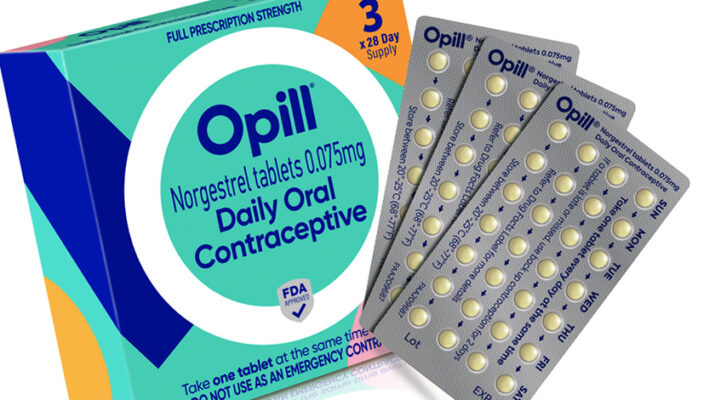Opill offers a 98% rate of effectiveness in preventing conception. It’s expected to hit the market in early 2024
By Deborah Jeanne Sergeant

The FDA recently approved Opill (norgestrel) as an over-the-counter oral contraceptive. It’s expected to be available early 2024, according to news reports.
Typically, oral contraceptives require a physician’s exam and prescription. Opill was first approved with a prescription in 1973. When taken as directed — one pill daily at the same time each day — Opill offers a 98% rate of effectiveness in preventing conception.
“This is so exciting,” said physician Elana Tal, UBMD Obstetrics & Gynecology, clinical assistant professor, Jacobs School of Medicine and Biomedical Sciences, University at Buffalo. “It could potentially be a big game changer.”
Tal said that unlike oral contraceptives that contain estrogen and progestin, Opill is safe for people who smoke or who have a history of blood clots, stroke or bleeding disorders.
The FDA’s website states that women who have or who have had breast cancer shouldn’t take Opill. Other contraindications include women who are pregnant or who think they might be pregnant, along with another birth control pill, vaginal ring, patch, implant, injection or an intra uterine device, or as an emergency contraceptive, also known as a morning-after pill. Men should also not take Opill.
Dual-hormone contraceptives typically warn that it’s not recommended for women 35-plus. However, Opill has no such contraindication. Its safety has been established for women as young as 15. However, sale of Opill will not be limited by age.
Opill has the typical oral contraceptive side effects. The FDA listed irregular bleeding, breast tenderness, headaches, nausea, dizziness, abdominal pain, increased appetite and bloating.
The FDA encourages women to discuss Opill with a healthcare provider or pharmacist if they currently take a prescription for drugs to treat seizures, tuberculosis, HIV AIDS, pulmonary hypertension or take an over-the-counter supplement containing St. John’s wort. Opill may interact with these drugs or become less effective. Opill can also affect the efficacy of emergency contraceptives.
Tal views Opill as a way for patients who want contraceptives but are between doctors or insurance plans.
“There are six million new pregnancies in the US a year, about half of which are unintended,” Tal said. “As access to reproductive healthcare and high-quality maternity care becomes difficult for people to access, what a game changer this could be, especially for the most disenfranchised among us.”
Although Opill will be available without seeing a doctor, PAP smears and routine care are still important.
The Centers for Disease Control and Prevention states on its website that “all women are at risk for gynecologic cancers and risk increases with age.” It’s vital that women seek preventative exams on the schedule their care provider recommends, even if they use Opill.
“Oral contraceptives are one of the many methods of family planning,” said Kafuli Agbemenu, registered nurse with UB School of Nursing and Women’s Reproductive Health Researcher. “With Opill, a contraceptive can be accessed in a timely fashion, without the delay of finding a healthcare provider, scheduling and attending a medical appointment, needing insurance to fill a prescription and actual availability of the contraceptive at an affordable cost. All these are even more challenging for younger people or those living in rural areas with limited access to healthcare providers. Opill will also enhance health equity by potentially increasing contraceptive access to underserved populations. Additionally, considering recent access to reproductive health services changes, an over-the-counter contraceptive will contribute to empowerment and bodily autonomy.”
She said that barriers to healthcare include geographic access, affordability, stigma, privacy and adherence.
Women taking Opill should take it for seven days prior to relying on it for contraception to better ensure its effectiveness. For many years, doctors have routinely prescribed oral contraceptives for controlling patient’s abnormal bleeding, period pain and other similar issues. But the FDA has not approved Opill for these uses. It’s vital that women seek a provider’s care for such symptoms and not try to self-diagnose and hope Opill will take care of it.
The active ingredient in Opill concerns the Rev. Jim Harden, CEO of CompassCare, which offers reproductive counseling and sexually transmitted infection testing and treatment services in Rochester, Buffalo and Albany and statewide via telehealth.
“Peer reviewed medical articles and the World Health Organization state that this exposure to steroidal contraception increases risks of cancer,” Harden said.
Harden writes extensively on medical ethics. His book “Ethical Theory and Pertinent Standards in Women’s Reproductive Health” was endorsed by the late Edmund D. Pellegrino, a physician and former chair of the President’s Council on Bioethics; senior research scholar at the Kennedy Institute of Ethics; and professor emeritus of Medicine and Medical Ethics at Georgetown University.
Hardin noted the National Institutes of Health’s statement about progestin-only oral contraceptives as “at least comparable to the risk of combined oral contraceptives” which the NIH said “increase the risk of breast cancer” as a “group 1 carcinogen for breast cancer, as well as for cervical and liver cancer.”
The FDA’s website states that “each Opill tablet contains 0.075 mg. of a single active steroid ingredient, norgestrel, a totally synthetic progestin.”
Harden believes that the side effects of Opill have not been clearly communicated to patients and that once it’s available without a prescription, many women, particularly younger women, will take it without reading any of the package warnings or without knowledge of it side effects.
“It appears this drug is wildly unsafe under normal circumstances, say nothing of giving access without physician oversight,” he said. “Once this is available over the counter, you’re eliminating the safety net that is so important to medicine.”
He believes that over-the-counter access to Opill would mean that women may try to take Opill off-label as emergency contraceptives, a use for which Opill has no FDA approval.
Colt Wasserman, a physician, views Opill as lowering barriers for people who face barriers in obtaining contraceptives.
“It provides another way of obtaining contraceptives,” he said. “I feel really excited for patients.”
Wasserman is chief medical officer for Planned Parenthood of Western and Central New York, which includes offices in Rochester, Canandaigua, Batavia, Buffalo, Niagara Falls and Syracuse.
Every county’s health department offers free condoms, as do many other organizations. However, Wasserman feels that “contraception is not a one-size-fits-all decision. It’s really important for each patient to have a lot of different resources to plan their future. I’m excited about barrier methods and condoms being widely available, but an over-the-counter contraceptive is only going to increase the number of choices people have.”
The cost for Opill is not yet known. If it follows the pattern of emergency contraception, which costs about $88, then Opill would not reduce barriers to contraception for people with a low income.
Opill will likely not have an age minimum for purchasing it. Youth who are too young to buy over-the-counter cough syrup will be able to purchase Opill once it’s available in the first quarter of 2024. As for concerns about teens taking Opill without parental supervision, Wasserman doesn’t see a problem.
“We know that teenagers and youth can understand how to use contraception safely and effectively,” he said. “Requiring some kind of ID proof of age can disproportionally affect those who don’t have access to an ID. When this was issued, it was decided to make it generally available.”
He also does not believe that greater availability of contraception will increase the rates of teens becoming sexually active. Wasserman wants parents to try to maintain open conversations about matters such as sex and “establish themselves as safe people in their youth’s lives to be able to provide guidance,” he said.

